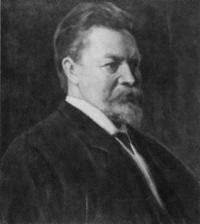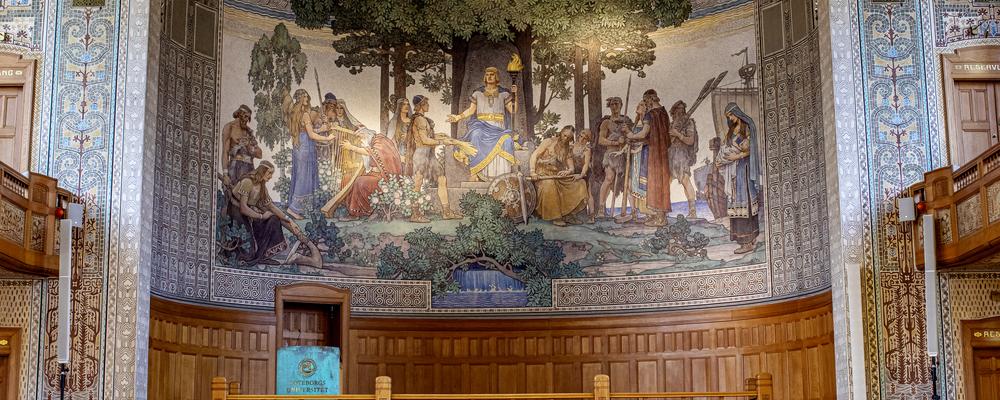
Our history
The history of the Department of Political Science can, to some extent, be told through those who have held the August Röhss Professorship in Political Science. Their research interests reflect how the discipline has changed and evolved from the early 20th century to the present day.
The August Röhss Professorship in Political Science
In 1901, Swedish businessman August Röhss donated a substantial sum –350,000 kronor, equivalent to over 20 million kronor today – to Gothenburg University College. The purpose was to establish four new professorships: in Geography, Economics, Sociology, and Political Science. Here we present the holders of the Professorship in Political Science.
Johannes Lindvall 2021–
Johannes Lindvall was born in Gothenburg in 1975. He defended his doctoral thesis on Sweden’s economic policy in the 1970s, 1980s and 1990s at the University of Gothenburg in 2004. In the second half of the 2000s, Lindvall was active at universities abroad; initially at the European University Institute in Florence, Italy, and then at Lincoln College in Oxford. He returned to Sweden in 2010 for a post at Lund University, where he was later promoted to professor in 2013.
In his research, Lindvall has endeavoured to place contemporary political problems in a comparative and historical context. For example, his latest book Inward Conquest: The Political Origins of Modern Public Services (2021, with Ben Ansell) deals with the emergence of public services such as the police, schools and healthcare. Lindvall has also addressed the link between political institutions and political decision-making (see Reform Capacity from 2017) and the relationship between political and economic development in democratic states, in particular when it comes to the labour market (see Mass Unemployment and the State from 2010).
Lindvall has been a visiting research fellow at Harvard University and Oxford University and is currently affiliated with the Institut d’études politiques de Paris (Sciences-Po) and Nuffield College, Oxford.
In addition to his work as a teacher and researcher, Lindvall participates actively in social debate. For example in recent years he has contributed to two books on the modus operandi of Sweden’s parliamentary democracy, Samverkan och strid i den parlamentariska demokratin (2017, with Hanna Bäck, Carl Dahlström, Elin Naurin and Jan Teorell) and 134 dagar: Om regeringsbildningen efter valet 2018 (2020, with Hanna Bäck, Johan Hellström and Jan Teorell). In English, these titles would be roughly ‘Cooperation and conflict in parliamentary democracy’ and ‘134 days: about the formation of the government after the 2018 elections’.
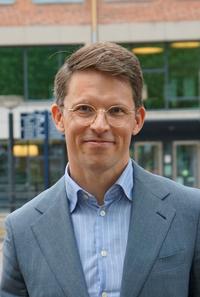
Bo Rothstein 1994–2021
Born in Malmo in 1954, Bo Rothstein received his undergraduate degree in social science at Lund University. In 1986, he defended his thesis entitled Den socialdemokratiska staten – Reformer och förvaltning inom svensk arbetsmarknads- och skolpolitik (The Social Democratic State – Reforms and administration in Sweden’s labour market and schools policy). For a number of years after graduation, Rothstein worked in the Department of Political Science at Uppsala University. During this period, he published, among others, two books with the titles Den korporativa staten (The corporatist state) and Vad bör staten göra? (What should the state do?). In the latter, he combined empirical analysis of what the state can do with normative reasoning about what the state ought to do.
As a professor of political science, Rothstein has published prolifically in the form of both journal articles and books. The list of his publications in Swedish and English is very extensive. His research touches on a wide variety of areas. Some of these are welfare policy, social trust, interest groups, corruption, and the quality of political institutions. Here we find book titles such as The Social Democratic State, Just Institutions Matter and Social Traps and the Problem of Trust.
Together with his colleague Sören Holmberg, Rothstein founded the research programme The Quality of Government Institute. At the heart of its research lies the importance of impartial institutions untainted by corruption. Important results from the research programme were published in 2012 in Good Government: The Relevance of Political Science (published with Sören Holmberg). A key thesis of the book is that the quality of public institutions is of crucial importance to citizens’ living conditions. Problems such as high child mortality rates, poverty and other social miseries are frequently caused by a dysfunctional state apparatus rather than by a lack of medicines, technical equipment, or the like. In 2021, he published two more books in this area: Controlling Corruption and The Oxford Handbook of the Quality of Government (co-edited with Andreas Bågenholm, Monika Bauhr and Marcia Grimes).
Rothstein is and has been very active on the international stage. He has been a visiting research fellow at the Australian National University, Cornell University, Harvard University and Stanford University for example. Rothstein’s research has attracted considerable international attention for a considerable period of time. In 2016, he took up a professorship in political science at Oxford University. The time he spent in Oxford, however, was rather short. He renounced his post in 2018. This decision was made in protest after information emerged that one of Oxford University’s biggest donors had also provided financial support to former President Donald Trump. Rothstein subsequently returned to the University of Gothenburg.
Rothstein has invested a great deal of effort in further strengthening the third-cycle programme in political science at the University of Gothenburg, with the aim of making this programme of study internationally competitive.
Rothstein has been very active in social debate. With polemical passion, he has taken a stand on a wide range of issues. And these stands have most often been based on research in political science or another social science.
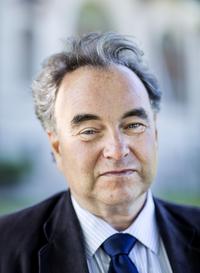
Bo Särlvik 1983–1993
Bo Särlvik was born in Borås in 1928. After studying history, he became affiliated with the Department of Political Science at the University of Gothenburg in 1953. From the start, he was an important collaborator of Jörgen Westerståhl’s in developing an ambitious National Election Studies program. In addition to his research work, Särlvik was firmly anchored in Sweden’s social democratic movement. This was how he came to be employed by Prime Minister Tage Erlander for a time, in parallel with Olof Palme.
Already in 1957, the constitutional inquiry of the time commissioned Särlvik to carry out a study of trends in public opinion in connection with the referendum on the occupational pension issue. The commission of Inquiry’s report helped to convince the Swedish Government of the value of having access to this new type of information. This created the financial rationale for carrying out a wide range of studies of Swedish elections and election campaigns using public funds.
In addition to reports from studies of voters, Särlvik published a series of papers in English on special issues in 1960. In 1970, he defended his compilation thesis Electoral Behavior in the Swedish Multiparty System. In 1973, he was invited to become a professor of political science at the University of Essex in England. For a number of the following years, he came to have an important responsibility for British opinion polls. He concluded his work there by publishing the book Decade of Dealignment with Ivor Crewe, which became an important contribution to the UK’s study of voter behaviour. Särlvik applied for the vacant professorship after Westerståhl and was successful. He took up the post in 1983. By then he had expanded his research interests to include comparative research of political parties and studies of political ideologies. As a professor, he put a great deal of effort into streamlining and revitalizing the third-cycle study programme. Särlvik took on many important roles within the academic system over the years. For example, he was Dean of the Faculty of Social Sciences at the University of Gothenburg and principal secretary of the Faculty of Humanities and Social Sciences Research Council.
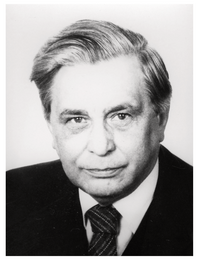
Jörgen Westerståhl 1952–1982
Jörgen Westerståhl was born in Stockholm in 1916. After studies in philosophy at Uppsala University, he began studies in political science at Stockholm University. His teacher was the legendary political science professor and publicist Herbert Tingsten. Westerståhl defended his thesis in 1945 entitled Svensk fackföreningsrörelse. Organisationsproblem. Verksamhetsformer. Förhållande till staten (The Swedish union movement. Organisational problems. Forms of operation. Relationship to the State). The subject of this thesis represented a thematic broadening of political science and inspired later research into the role of interest groups in politics.
As a Reader at Stockholm University at the end of the 1940s, Westerståhl began to take an interest in voter behaviour. This research broadened after he was appointed to the professorship at the University of Gothenburg in 1952. By that time he had come into contact with the leading American election researchers during a sojourn in the USA.
In 1952 Westerståhl was appointed professor of political science at the University of Gothenburg. He brought to the University a vision of a science focused on political behaviour and political institutions. He soon recruited a young assistant named Bo Särlvik. Together they conducted a test poll with a selection of voters from Gothenburg and two rural municipalities outside Borås in connection with the 1954 municipal elections. This laid the foundations for the Swedish National Election Studies Program at the University of Gothenburg, which has been conducted for many years and has had great media exposure and impact. On a broader plane, Westerståhl’s interest in large empirical studies meant that the actual functions of democracy came to be investigated in a variety of ways.
In the 1960s, Westerståhl initiated extensive studies of Swedish municipalities during a period of major change in the form of municipal mergers. Most political science departments in Sweden were involved in these studies, which gave rise to a large number of theses.
Another area that Westerståhl was very much interested in was objectivity in various forms. In the sciences, he claimed that the ideal was to be value-free. A discipline like political science should be a science ‘about politics’ not ‘in politics’. In the field of public service, Westerståhl carried out a series of empirical studies on objectivity in news reporting. Here he found that deficiencies of various kinds could be noted. In addition to his scholarly achievements, Westerståhl had a number of public offices. For example, he was secretary of the extensive constitutional inquiry between 1954 and 1963.
In honour of Westerståhl, the Department of Political Science at the University of Gothenburg hosts a seminar each autumn in where prominent international researchers are invited to give a lecture.
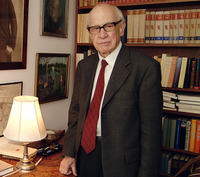
Georg Andrén 1929–1952
Georg Andrén was born in Örgryte in 1890. He studied at the university in Gothenburg (then called Göteborgs högskola) and graduated in 1913. When his teacher Rudolf Kjellén moved to Uppsala three years later, Andrén followed him. His doctoral thesis in 1920 entitled Federalism i den tyska riksorganisationen 1871-1914 (Federalism in the German national federation) dealt with a subject – Bismarck and the German empire – that was close to the heart of Kjellén. A few years later, Andrén published another major work about Germany – Huvudströmningar i tysk statsvetenskap (Principle currents in German political science). The work is exceptional in that it is the only major work in the history of political science doctrine to be published in the last hundred years.
After his previous writings having mainly been concerned Germany, Andrén’s interest gradually shifted to another country, namely the United Kingdom. When he applied for the professorship at the university in Gothenburg in 1929, he had completed a manuscript of more than 700 pages devoted to Parliamentarianism and political parties in England during the period of minority governments 1846-52. On the basis of the breadth and depth of his research, Andrén was appointed professor in 1929.
In no way did Andrén neglect the Swedish political system in his research. In 1937 he presented a new 700-page work, this time on The birth and development of the bicameral system. This immediately became a standard work in its area.
Like Kjellén, Andrén was politically active at the national level. He was a Conservative and a member of the Swedish parliament, the Riksdag, for some years in the 1920s and again after 1938. It is worth noting that Andrén distanced himself from the rise of Nazism at an early stage.
For a short period of time, Andrén worked as a cabinet minister in Per-Albin Hansson’s coalition government. From the autumn of 1944 until the end of the war the following year, Andrén was the minister with responsibility for education and ecclesiastical matters. Shortly after leaving the Riksdag at the end of 1951, he was appointed county governor in Uppsala, where he stayed until his retirement five years later. In connection with his appointment as county governor, Andrén formally left his professorship at the university in Gothenburg.
Peter Olof Gränström 1917–1927
Peter Olof Gränström was born in 1877 in Skatelöv in the province of Småland in Sweden. He received his degree from Lund University, where in 1910 he presented his thesis in political science entitled Om sammanjämkning av skiljaktiga beslut i riksdagen (On reconciling differences in decisions in the Riksdag). In his early work, studying the Swedish Riksdag was the focus of his interest. Granström became a prominent expert on the ståndsriksdag (Riksdag of the Four Estates) between the years 1809–1866. He was also involved in developing an analysis of the issue of the background and content of the 1809 Instrument of Government (regeringsform), which had previously been vigorously debated among political scientists. He emphasized the national character of this constitutional document. According to him, while it is true that one may at times glimpse the influence of Montesquieu’s theory of the separation of powers in one respect or another, in terms of content, national perspectives are decisive.
After studies of life in the Swedish Riksdag, Gränström’s interest came to be focused on the constitutional and realpolitik features of the British Empire. It was in this context that he became a disciple of Kjellén’s great-power orientation in political science, where geopolitics played an important role.
Gränström was appointed to the August Röhss professorship in 1917 and held it until his death ten years later.
For Gränström, objectivity in matters of research was vital. He was a liberal in his political views, but he did not allow his own political views to be reflected in his writings on political science. Gränström’s successor, Georg Andrén, has stated that Gränström did not approach his scholarly tasks as a means of ‘proving a new theory, but clarifying a context’.
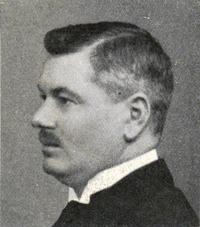
Rudolf Kjellén 1901–1916
When the precursor of the University of Gothenburg (Göteborgs högskola) was founded in 1891, seven professorial chairs and one associate professorship (docent) were established. The latter concerned political science and geography. It was to this position that Kjellén was recruited from Uppsala. He was born in 1864 on the island of Torsö in Lake Vänern, and in 1890 he defended his thesis on ministerial responsibility. When Kjellén came to Gothenburg, he had no knowledge in the field of geography. However, he quickly compensated for this deficiency and learnt about the various aspects of geography – from purely natural geography to cultural geography. Through a fortunate theoretical construct that included both political science and geography, namely geopolitics, Kjellén was able to accomplish two things at once. In fact, it was Kjellén who coined the now internationally accepted term ‘geopolitics’. This occurred in the geography journal Ymer in 1899.
When a professorship in political science was created on the basis of the August Röhss donation in 1901, Kjellén became its first holder. During his professorship, he paid particular attention to international politics. Geopolitics, which in simple terms can be said to the study of the political significance of a variety of geographical factors, was an integral part of this focus of study. A number of writings on the great powers and the politics of great powers were produced during the period before the First World War. Kjellén’s language is fresh and engaging. In Germany, in particular, these publications went out in large print runs. In his lectures in Gothenburg, Kjellén so often pointed out that a planetary situation had arisen in the politics of the great powers that he was called by the students ‘the planetary professor’.
In addition to his academic career, the crowning achievement of which was being called in 1916 to become the Johan Skytte Professor in Eloquence and Political Science in Uppsala, Kjellén was active as a politician. During the first two decades of the new century we find him a couple of times serving as a Conservative representative in the Riksdag. He developed there a non-democratic ideology with corporative overtones – and was explicitly opposed to women’s suffrage. Kjellén wanted to the conflicts between the classes to be subordinated to a joint endeavour for the nation’s best. As an important part of this endeavour, he launched the idea of folkhemmet (the people’s home), a term that the Social Democrats party leader Per-Albin Hansson took up at the end of the 1920s (and imbued with a somewhat new meaning).
